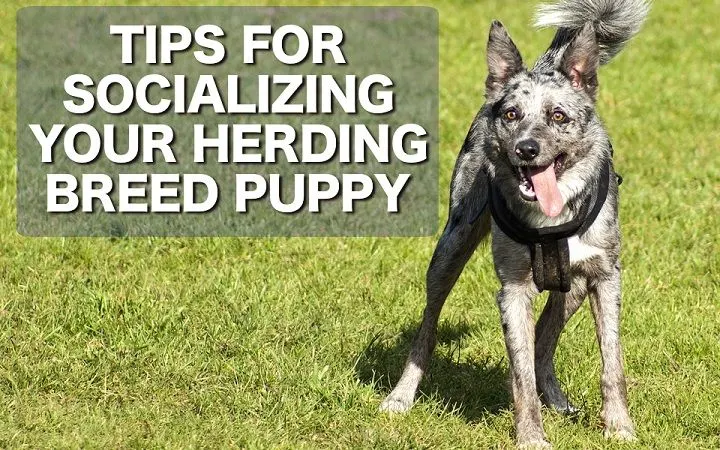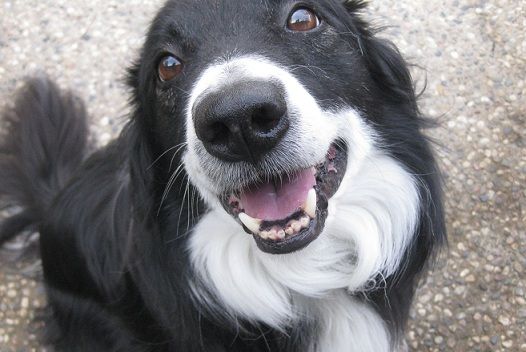The following are my tips for socializing your herding breed puppy such as a border collie mix, a German shepherd mix or a cattle dog, but really this post could apply to all dogs.
Sometimes herding breeds are extra sensitive to movement and sounds, but you obviously want to get any powerful breed used to different scenarios and meeting new people, if at all possible.
While reading this, keep in mind all dogs are individuals. While some herding dogs will chase and react to anything that moves, some border collies are couch potatoes. Some Aussies have no interest in Frisbees.
This post is generalizing a large group of dogs.

1. Get your herding breed puppy used to wheels!
These dogs are bred for herding, which is a wonderful thing, but that can also mean they’ll try to chase (and in some cases, nip) at anything that moves!
Slowly introduce your collie or shepherd puppy to runners, people on rollerblades, bikes, skateboards, strollers, motorcycles and anything else you can think of that she might be around as an adult.
See my post: Getting a dog used to bikes.
2. Keep introductions calm and cool.
When introducing your puppy to a new experience, try not to overwhelm her but encourage calm, curious behavior. Let her slowly investigate when it’s safe and when she seems interested. Reward her for calm behavior with food.
Don’t over-react to noises or movements yourself, even if you are startled. Stay calm and cool, like rollerbladers coming around the corner are no big deal.
3. Sign up for basic training classes.
I know, I know. Training classes are expensive and time consuming. And sometimes the class instructors may know less than you do about training.
BUT, there are few ways to practice working with your puppy around distractions – such as other puppies and other dogs. A training class is a safe way to do so where everyone else is in the same boat.
Hiring a one-on-one trainer is worth it too. Especially if you have specific training concerns or if you have little or no experience with dog training (totally understandable, we all start somewhere!) or if you need help with your specific breed of dog.
I like the socialization aspect of group classes, personally, but that’s also because my current dog is pretty easygoing.
See my post: Importance of dog training classes.
4. Get your puppy used to loud noises.
Herding breeds can be extra sensitive to loud noises. Safely exposing your puppy to various loud situations slowly over time and rewarding her for calm behavior can help her deal with this kind of “stress” in real-world scenarios.
With loud sounds or anything that could potentially scare your pup, just start out far away (so it’s less intense) and slowly move closer if she seems comfortable. Or, move closer to the source of noise the next time around.
Some examples you could seek out could be:
- Walking by busier roads with truck and bus traffic
- Walking by lawn mowers or other machinery in the neighborhood
- Randomly dropping books or coins
- Band instruments
- Fireworks videos
- Motorcycles and boats
- The sound of skateboards (Note that some dogs are triggered by the noise of skateboards and others are triggered by the movement)
See my post: How to help a dog with extreme fireworks anxiety.
5. Socialize your puppy to other animals and children.
I always like to stress the importance of listing out everything your future adult dog will need to be comfortable with in her life with you.
Some examples could be vacuum cleaners, car washes, car rides, cats, farm animals, strollers, doorbells, gun shots, people of all ages and sizes and wearing different hats and uniforms and moving at different speeds, crowds, events, playgrounds, etc. etc. etc.!
The possibilities are endless, really, but may best advice is simply to take your puppy out and about to as many new places and events as you can in the first six months. That alone will expose her to much of her new and future life with you.
Enjoy!


Patti
Friday 6th of April 2018
I am having trouble with my 2 year old lab. He is fearful of people, especially men. He loves children, women and teens. With men he runs up to them so happy and gets within 2 feet and barks then jumps away!! He is fearful unless I place my hand over theirs. Sometimes it works other times not. I can’t remember him having any bad experience with men. My husband is very affectionate with him as is a our 5 grandchildren and extended. Can you give me some advise to help him feel more at ease? Thanks Patti. My dog’s name is Cooper!
Sandy Weinstein
Thursday 5th of April 2018
this is one reason breeders take their puppies to shows, to get them used to the crowds, people, noises, so when they go in the show ring, they will not be scared. i just went over this with a new friend that has a 4 yr old mini poodle mix, that is not friendly with other people, scared of other people and dogs, does not like kids, etc. she could not understand why her dog was so scared of other dogs, etc. when she goes somewhere with the dog, she hides behind the owner, will not play with other dogs or even approach them, she runs and hides. she does not like other people touching her except the owner. i tried to tell her it is only going to get worse as the dog ages. now my oldest dog that passed away, prefered to be around people than dogs but she did not run away or hide, she was just a people person. she was even attacked by 2 dogs and still liked being around other dogs. she was also wonderful with all people and kids as are my 2 girls now.
Steph
Monday 27th of March 2017
We adopted a 1.5 yr shepherd husky mix recently and are trying to soclialize him to people and other dogs but he gets incredibly excited especially for other dogs. When he is this excited he will not come back when called. He has come along way in the 3 months we have had him but he definitely needs more work. Any other suggestions for us?
Stephany P.
Tuesday 5th of July 2016
I LOVED that article. Spot on, especially on the benefits of classes. I have a socialization question though regarding my 2 1/2 year old German Shepherd. She's wonderful with all people -- the young ones and the older ones. She's been awesome with other dogs too, mostly acting submissive around dogs her size and larger (she's only about 50 pounds...she's a little thing!). Recently, however, I've noticed she'll snarl and even snap at dogs, especially puppies. How much of this should I try to correct (she never bites, but it seems like it's a little aggressive) verse how much of it should I just let her be? She's acting like a grouchy old lady! Should I try socializing her more? She doesn't seem very interested in wrestling around, even with her regular pup-pals.
Anna
Tuesday 5th of July 2016
Could there be a medical reason for this change in behavior? Just a thought.
Lindsay Stordahl
Tuesday 5th of July 2016
That's a good question and one I wonder myself with my old guy Ace. He doesn't care to socialize with other dogs much like he used to and is at times aggressive with my puppy. I think in your case, what if you found some calm, mellow dogs for her to be around? Dogs that aren't going to demand playing. Maybe she would appreciate just "being" with dogs without feeling like she needs to correct them when she's uninterested in playing. Or maybe going on group walks if you have friends with well-behaved dogs.
Anna
Thursday 12th of November 2015
I'm also excited for your family considering a shepherd pup! Our dog bikes with me and couldn't care less about people on bikes, but just yesterday, for the first time, we saw a girl on an elliptical bike, swoosh swooshing. We were both fascinated and I don't know if he'd chase one on a street, ha ha. Great tips!